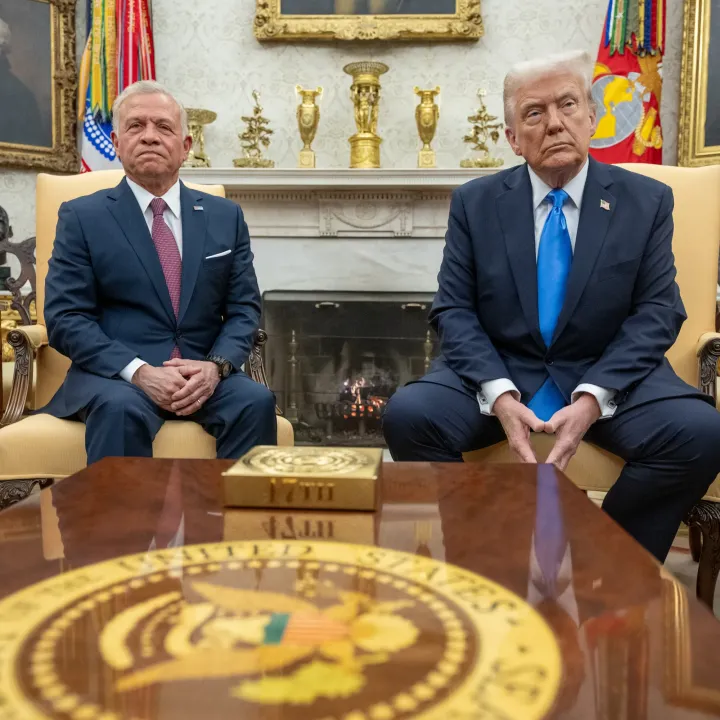
- Policy Analysis
- Fikra Forum
Balancing National Security and Economic Priorities in the U.S.-Jordan Relationship

As the U.S. administration shifts towards an economics-first approach to foreign policy, Jordan will need to find ways to emphasize the benefits of the two countries' decades-long broader strategic relationship in public messaging—both for its own national security interests and as a way to assuage public concerns.
Recent developments in U.S.-Jordanian relations, from the announcement of President Trump’s “Middle East riviera” plan for Gaza to tariff announcements—have prompted the question of how Jordan will deal with the current regional challenges it faces as the United States reorients to an economy-focused approach.
For a country like Jordan, which has relied on a combination of military support and diplomatic engagement with the United States and Israel for more than seven decades, its primary challenge now lies in integrating these new market-based visions with the realities of the entrenched political conflicts that surround and impact its domestic national security. Jordan will have a dual challenge: managing domestic attitudes towards this U.S. reprioritization and, on an external level, articulating a dynamic and forward-thinking strategy to emphasize its continued importance to U.S. policymakers.
On the one hand, Jordan's options in response to a more distant United States are few and far from ideal; yet Jordan has its own strong incentives to promote stability in the region, as well as concrete examples it can point to regarding how the value of its relationship with the United States extends beyond the economic when it comes to the impact of its stability and security in broader regional dynamics. Perhaps most importantly, Jordan has been and can continue to be a regional first line of defense against all types of extremism, whether leftist, nationalist, or religious. Ensuring that this message reaches those in power in the United States may require more extensive and creative avenues than in the past, but will be vital in emphasizing the ongoing value of the relationship.
Managing Jordan's Domestic Shift in Public Opinion
For many Jordanians, the shift in U.S. policy towards the region is now epitomized by President Trump's “Middle East Riviera” initiative, demonstrating a radical departure both in form and content from the traditional diplomatic approaches that have prevailed since World War II and the end of the Cold War. The tenor of Trump’s historic meeting with King Abdullah II at the White House on February 11 likewise laid bare the president’s preference for solutions driven by traditional capitalist market forces at the expense of hitherto orthodox considerations for political, social, and security measures.
Within Jordan, a large portion of conversations and social media around the issue continue to express skepticism and genuine fear that economic gains will be prioritized over the pressing needs of the people of Gaza. There is also a strong perception that Trump's plan is quixotic relative to the proposed Arab alternatives. This view is in spite of the practical issues that likewise exist with these proposals; Hamas has yet to acknowledge defeat or agree to disarm and relinquish control of the Gaza Strip, both necessary conditions for the Arab alternatives, while the guarantor Arab states—particularly the Gulf countries and Egypt—lack a solid, unified framework for implementing their plan, especially as it pertains to the execution and funding of reconstruction.
This ongoing dissatisfaction with the proposed American solution reflects deeper concerns about the direction of American foreign policy and its impact on regional stability. These concerns further solidified in reaction to the U.S. administration's decision to raise tariffs on Jordan by 20 percent and the temporary suspension of financial aid despite Jordan's role as a close ally of the United States—though diplomacy has since rolled back these freezes on key areas of U.S. support to Jordan.
Such attitudes have an impact on Jordan's national security—the Muslim Brotherhood (disbanded since 2020), through its political arm, the Islamic Action Front Party (IAF) and its pro-Hamas constituency has exploited these conditions to lead a systematic campaign aimed at fueling anti-American sentiment, as has Iran. The perception that Hamas is an indomitable force in Gaza and the momentum created by the jihadist group Hayat Tahrir al-Sham taking control in Syria has mutually reinforced the idea in Jordan that Islamism—and by extension the Muslim Brotherhood—is in the ascendance. The uncertainty surrounding the Egyptian plan for Gaza reconstruction adopted at the Cairo Summit likewise underscores the perception that there are no good regional alternatives at present to halt the momentum of an ideology that is inimical to all of the Arab countries.
Such attitudes make it all the more imperative that Jordan and the United States cooperate on dismantling the links and alliances between these parties to rehabilitate popular attitudes in a way that serves to improve Jordanian-American relations and ensure Jordanian national stability. Maintaining a stable country in an often unstable region can be aided by enhancing intelligence information exchange mechanisms, regular high-level consultations, and coordinated crisis management protocols ensuring rapid and effective responses to emerging threats and issues. However, public messaging can also play a key role.
The importance of Jordan's counterterrorism efforts was highlighted on April 15, when Jordan's General Intelligence Department announced through government spokesman Mohammad al-Momani that a major terrorist plot consisting of four cells affiliated with the Muslim Brotherhood had been foiled and that sixteen members had been arrested. On state television, the defendants confessed to receiving training in Lebanon, manufacturing rockets using local and imported tools for illegal purposes, possessing explosives and firearms, hiding a ready-to-use rocket, implementing a project to manufacture drones, and recruiting and training elements inside Jordan and subjecting them to external training. The case is currently being heard by the State Security Court, and the Jordanian Parliament's April 21 session unanimously condemned the practices of the Muslim Brotherhood and the Islamic Action Front. This is a moment where coordinated messaging can impact the shift in Jordanian attitudes towards the United States. To date, neither the State Department nor the White House has issued a statement regarding the plot, but a statement condemning it and expressing full support for the Kingdom's efforts would be a clear message to the Jordanian people on the stability of U.S.-Jordanian relations. The incident likewise highlighted the importance of ongoing U.S. support for the security and intelligence services, the army, and the national economy, including budgetary support and a reduction in tariffs on par with Egypt and Israel.
The positive impacts of such public messaging are already evident; as negative as the public reaction was to Trump’s plan for Gaza, the subsequent meeting between Trump and the Jordanian King and Crown Prince in February, where the King articulated a clear message on the Jordanian support for the Palestinian people, had a strong positive impact on public opinion regarding domestic politics. King Abdullah II received a warm public reception upon his return from Washington, with people in the streets chanting "Jordan First" and "Jordan for Jordanians" in line with the American administration's "America First" slogan, in spite of criticism from Muslim Brotherhood and pro-Hamas Palestinian circles. President Trump's message directed to the Jordanian people on February 12, 2025, in which he praised King Abdullah II and the people of Jordan following their meeting, likewise provided an example of the value of coordinating crisis management and the continued value of high-level exchanges on Jordanian attitudes.
Highlighting Jordan's Regional Role
The interaction between security cooperation, economic activity, and humanitarian accountability is the cornerstone of a resilient regional framework. Conversely, a purely market-driven approach—as embodied by Trump's plans for the region—risks marginalizing vital security measures that have historically maintained regional stability and alienating the public. However, Jordan can play a more public role in these efforts as the United States seeks to step back, benefiting both parties. Jordan will continue to have a key and constructive role in the Levant amid the fragmentation of historical Palestine and the political failure in Syria and Lebanon.
Just as the United States can provide strategic public signals that can help the current tenor of Jordanian public opinion, Jordan will need an unusually active approach in emphasizing the importance of the U.S.-Jordanian bilateral relationship to American political stakeholders—with broad engagement with political blocs and lobbies in both the Republican and Democratic parties, civil society organizations, research institutions, and the American media to explain the enduring value of the bilateral relationship.
There are opportunities for Jordan to publicly signal that it takes Washington's economic concerns seriously—either by emphasizing extant efforts or publicizing new initiatives that address tax evasion, help control spending, tackle administrative laxity, address disguised unemployment, or reduce waste in electricity and water networks. Concurrently, Jordan will likely be adjusting its own expectations of the United States—plans and programs should be built on firm foundations that do not sway with every change of administration in Washington. With its skilled, cost-effective workforce and growing expertise, Jordan can also emphasize the value of its human capital in the technology and service sectors. Amman can also highlight its understanding of Washington's priorities in a serious discussion on the issue of tariffs; Jordan’s free trade agreement with the United States is the first of its kind between the United States and an Arab country and serves as a symbol of the strength of the bilateral trade relationship that has held since its signing on October 24, 2001.
And in many ways, Jordan's efforts with the United States and Israel to promote regional integration over the last several years have focused on developing a new framework of shared economic benefits. Investment in shared infrastructure, energy, and water projects—which unfortunately stopped due to the war—along with technology transfer are all initiatives that can contribute to building trust and enhancing long-term cooperation in the future. Emphasizing that such efforts are guided by principles of transparency, accountability, and commitment to shared strategic interests in accordance with current American administrative standards will likewise be a major public signal of the alignment between national priorities with the broader goal of regional stability. And when it comes to addressing broader regional issues, the prospects of economic development present an enticing vision for a besieged and devastated area like Gaza, but Jordan can provide initiatives to ensure that this vision does not come at the expense of vital security and humanitarian imperatives.
Jordan should continue to fulfill its historical commitments to the United States and Israel while adapting to emerging challenges through innovative and integrated strategies. Achieving balance between the appeal of market-driven solutions and the practical necessities of security and stability will require wise decisions, and this can only succeed with solid and generous American support, as well as close cooperation among all concerned parties. In each side, public messaging addressing the needs and priorities of the other side can go a long way in terms of ensuring the ongoing success of a longstanding bilateral relationship.


